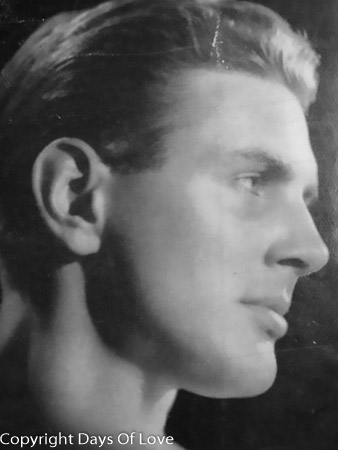

Partner Charles Hulse
Queer Places:
17 Gay St, New York, NY 10014
Princeton University (Ivy League), 110 West College, Princeton, NJ 08544
Hydra, Idra 180 40, Grecia
Rampart St, Galle 80000, Sri Lanka
Greenwood Cemetery, Schoolhouse Rd, Brielle, NJ 08730, Stati Uniti
 William
Gordon Merrick (August 3, 1916 – March 27, 1988) was a Broadway actor,
best-selling author of gay-themed novels and one of the first authors to write
about homosexual themes for a mass audience.
William
Gordon Merrick (August 3, 1916 – March 27, 1988) was a Broadway actor,
best-selling author of gay-themed novels and one of the first authors to write
about homosexual themes for a mass audience.
William Gordon Merrick was born in Bala Cynwyd, Pennsylvania, a suburb of Philadelphia. His father, Rodney King Merrick, was a manager of a truck company who eventually became a bank manager. His mother was the former Mary Cartwright Gordon (born Natchez, Mississippi, 26 July 1893). He had one sibling, Samuel Vaughan Merrick 3rd (1914-2000; married 1947, Eleanor Perry; three children, John Rodney, Melvin Gregory, and Thaddeus Merrick). Merrick was a great-grandson of Philadelphia philanthropist Samuel Vaughn Merrick (1801-1870).
He enrolled at Princeton University in 1936, studied French literature and was active in campus theater. He quit in the middle of his junior year and moved to New York City, where he became an actor. He landed the role of Richard Stanley in George S. Kaufman and Moss Hart's The Man Who Came to Dinner. Although he became Hart's lover for a time,[1] Merrick tired of the theater, with its endless nights playing the same role.[2]
In 1941, Merrick quit Broadway to become a reporter. Exempt from the draft because of problems with his hearing, Merrick moved to Washington, D.C. where he got a job with the Washington Star. He later worked for the Baltimore Sun, then returned to New York to write for the New York Post. His years as a reporter helped him develop a love of writing as well as a writing style.[2]
Still eager to participate in World War II, Merrick sought and won a job with the Office of Strategic Services (O.S.S., the forerunner to the Central Intelligence Agency). He was sent to Algeria as a counter-espionage officer, rising to the civilian rank of captain. He was diverted to France and took up residence in Cannes. Because he spoke excellent French, the O.S.S. gave him papers listing him as a French citizen. He was case officer for the double agent codenamed "Forest".
In August 1945, Merrick returned to the United States. He again tried to find work as a reporter, but failed. So he went to Mexico and began writing.
.jpg)
Princeton University, NJ
Merrick's first novel, The Strumpet Wind (1947), was a huge success in the United States for a gay novel.[3] The somewhat autobiographical novel is about a gay American spy in France during World War II. Homosexual themes are minimized in the novel, which explores concepts of individual liberty and freedom. The spy's director is a dazzlingly handsome but sadistic bisexual.
With the money he earned, Merrick returned to France. Merrick continued to write in France, but success eluded him. He left France to avoid the unrest which accompanied the Algerian War of Independence. Merrick moved to Greece and took up residence on the island of Hydra.
During his Greek tenure, Merrick's best-known book, The Lord Won't Mind, became his second major American success. Charlie Mills and Peter Martin are both young, handsome and well-endowed. They meet and fall madly in love. The book has been criticized for its insistence on beauty in the gay male world.
The book appeared on the New York Times Best Seller list for sixteen weeks in 1970. The first in a trilogy, Merrick followed it up with One for the Gods in 1971 and Forth into Light in 1974. In 2004, German screenwriter Renatus Töpke wrote several drafts of a screenplay. Currently, Munich production company and Paradigma Entertainment is attempting to raise money to finance a motion picture based on the books.[1]
Merrick left Greece in 1980, when the local tourism industry made Hydra too crowded for his taste. In that year he moved to Ceylon (now known as Sri Lanka), having bought property there in 1974. But he returned to France occasionally, eventually purchasing a home in Tricqueville. For the rest of his life, he divided his time between the two countries.
Gordon Merrick died in Colombo, Sri Lanka, of lung cancer on March 27, 1988. He was survived by his companion, Charles Gerald Hulse (born 1929), a dancer turned actor turned novelist (In Tall Cotton, 1987).
My published books: